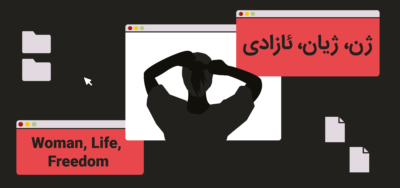As we prepared December 2019’s edition of our Filterwatch report in early January, Major General Qassem Soleimani — the Commander of the Islamic Revolutionary Guard Corps’ Quds Force — was assassinated in a US drone strike at Baghdad International Airport. In the following week, large crowds of people took to the streets to participate in Soleimani’s public mourning processions across Iraq and Iran, eventually resulting in the deaths of at least 56 people in a stampede during the burial procession in Soleimani’s hometown of Kerman.
Iran’s retaliatory strikes on US military bases in Iraq on 8 January escalated regional tensions further. The same evening, Ukraine International Airlines Flight 752 to Kiev crashed soon after take-off from Imam Khomeini Airport, killing all 176 onboard. Iranian officials at first denied any involvement in the incident, but on 11 January eventually admitted that the passenger plane was shot down by mistake, blaming “human error” and stating that it had been mistaken for an American military aircraft.
The admission by the Iranian government has sparked further nationwide protests, which appear to be still ongoing. The events of the past ten days have led to the unnecessary loss of hundreds of innocent lives, and has placed at risk the lives of millions of others both in Iran and in the region. As protests and instability continue, Small Media recognises that there are heightened risks to the rights of Iranians to freedom of expression and freedom of assembly, especially in light of the total internet shutdown and harsh crackdown on protestors we saw in November 2019.
During such periods of unrest, the upholding of human rights and digital rights is more critical than ever. Not only should the people of Iran be allowed to hold peaceful protests, but they should retain safe, reliable and uninterrupted access to the global Internet to make their voices heard. Maintaining the free flow of information into and out of the country also allows human rights groups and observers to monitor the situation, and to hold the government of Iran accountable for their response to the protests.
Here at Small Media, we’ll continue our work to monitor digital rights challenges and internet freedom in Iran, and to provide accurate and up-to-date information to support Iranian citizens to access information freely.

Draft Bill for Access to Internet Proposed in Parliament
On 10 December, Seyedeh Hamideh Zarabadi, MP for Ghazvin, Alborz and Abyek and member of the Industry and Mines Commission proposed a semi-urgent new Bill concerning internet shutdowns and access to the internet in times of national emergency.
The proposed Bill prohibits any internet disconnection or any disruptions to access domestic or international services without the Parliament’s approval. It also states that in the case of national emergencies, the government can only disconnect or restrict access to the internet with the approval of the Supreme Council for National Security if it has given prior notice to the public.
In light of the recent internet shutdown, the proposal is a significant step in adding legal constraints to the government’s powers to restrict or shut down the internet, however it remains to be seen if the proposal will secure the necessary support from Parliament to pass.
Iran and Turkey Hold Meeting on Mutual ICT Cooperation
On 24 December the first meeting of the Technical Committee on Cooperation between Turkey and Iran in the field of ICT took place over two days in the presence of officials from both countries; Satar Hashemi, Iran’s Deputy ICT Minister for Innovation and Technology and Omer Fateh Sayan, Turkey’s Deputy Minister for Transportation and Infrastructure discussed areas of cooperation between the two countries in areas of regulation, e-commerce, cybersecurity and infrastructure. The aim of this meeting was to strengthen and broaden Iran and Turkey’s relationship in the field of ICT.
Iran has been holding a number of meetings with its regional partners around cooperation in ICT technology, seeking to engage with alternative markets in the face of US sanctions, as well as contributing to the localisation of infrastructure and content.
Supreme Council for Cyberspaces Gives Three Week Deadline to ICT Ministry for Completion of Plans for the National Information Network
Following a meeting of the Supreme Council for Cyberspace (SCC) on 14 December, SCC Secretary Abolhassan Firouzabadi announced their decision to issue a three week deadline to the ICT Ministry to produce a completion plan for the National Information Network (NIN) comprising two sections: basic services and business services. According to Firouzabadi, the SCC will then approve the plan within two months.
Firouzabadi stated that the decision came about following the SCC’s assessment of the progress of the NIN in terms of infrastructure, content and user services, security and tariffs and the NIN progress evaluation by the National Centre for Cyberspace which disputed the 80% completion claim from the ICT Ministry, placing it at a lower figure. He added that during the recent internet shutdown it was made apparent that domestic services such as search engines and messaging apps cannot provide adequate services to users, and the majority of the population still relies on international services.
In addition, the SCC has allocated responsibility for the completion of domestic content and applications to the ICT Ministry, which was formerly only responsible for the development of its infrastructure.
The SCC has placed the progress of the NIN high on its agenda, and has been scrutinising the ICT Ministry’s progress in this area. Centralising all aspects of the NIN under one ministry should allow for more control over the process by SCC, and their expanded oversight role may be designed to speed up progress on the project’s implementation.

600 Schools Connected to the National Information Network
On 16 December, Hamid Fatahi, Deputy ICT Minister and the Head of the Telecommunication Infrastructure Company (TIC) announced that 600 schools “have been connected to the NIN.”
He stated that the ICT Ministry provides the required connectivity infrastructure while content is produced by the private sector with the approval of the Ministry of Education.
According to Fatahi, the project will cost 100bn IRR, and is funded by the ICT Ministry.
Connecting essential services and organisations such as schools, universities, banks and hospitals to the NIN has been underway for some time, as one of the first phases of launching the NIN. The recent shutdown showed that this has been implemented relatively successfully, with news agencies reporting that banks and hospitals remained online during the shutdown. Authorities are aiming that in the event of internet shutdowns, these vital services should be able to continue uninterrupted, limiting damage to society and the economy.
ICT Ministry Denies Government Involvement in December’s Internet Disruptions
On 25 December Iranian news agency ILNA reported disruptions to global mobile internet connections in “several provinces” across Iran. The report was also confirmed by NetBlocks, which reported that connectivity continued to drop the following day.
The timing of the disruptions were in line with the heightened state security presence in various cities in Iran, which was reported by BBC Persian in anticipation of anti-government protests.
The Spokesperson for the ICT Ministry, Jamal Hadian denied reports of another internet shutdown in a tweet on the same day. Several of the major mobile network providers such as Irancell, RighTel and Hamrah-e-Aval also denied disruptions to their mobile network coverage. Despite the fact that these network disconnections and interruptions did not lead to a wider total internet shutdown, it is clear that the government continues to target the internet during times of unrest or politically sensitive periods.

Internet Shutdown Continued in Sistan and Baluchestan Province Despite Connectivity in Rest of the Country
Although connectivity to the global internet was restored in almost all of Iran by the end of November, after a government crackdown on protestors, the southeastern province of Sistan and Baluchestan did not have mobile internet connectivity for an additional ten days. Official news outlet ISNA reported on 4 December that mobile internet connection was gradually restored in the province. It was also reported that the continued disconnection is unrelated to the November protests but there are some “security concerns” inside the province which prevented the internet reconnection.
The continued disconnection in some provinces while the rest of the country is connected to the global internet is a major feature of having a nationalised internet structure. It would mean that province-specific internet shutdowns can take place without interrupting the wider internet connection for the rest of the country. This would risk the internet shutdown going unnoticed by the media and activists inside and outside Iran and would restrict the flow of information in and out of the country in times of crisis.
Persian Language Font “Innovation” Revealed by the ICT Ministry
On 22 December the ICT Ministry’s Head of Public Relations, Jamal Hadian, revealed a new Persian language font named “Fanavari” (meaning “Innovation” in Persian) exclusively for the ICT Ministry.
Hadian explained that the new Persian font is not going to be used officially by the ICT Ministry, and that it is “ceremonial and promotional”. However, Hadian argued that the font paves the way for the creation of more standardised Persian-language fonts for use in cyberspace. He also announced that the ICT Ministry are aiming to introduce further fonts to be revealed between now and World Telecommunication Day which is in May, with the objective of them being used by innovators and technologists instead of fonts designed for use in Arabic.
The rollout of new Persian language fonts supports the government’s plans to localise online content, and optimise online services for Iranian users. The development of new fonts is also in line with the policy of preservation of culture online, which is especially important in the context of a national internet.

ICT Ministry Official Claims Google’s “Sanctioning” of Iranians “Will Not Cause Users Problems”
Since the introduction of numerous rounds of sanctions on Iran by the US over the past two years, tech companies have had many shortcomings in supporting Iranian users through sanctions over-compliance and lack of transparency, which we have written on already. Notably, this has already been demonstrated by Google when it removed a number of Iranian apps from the Google Play Store last year.
On 17 December official news agency, Mehr News, reported claims that unofficial reports have suggested that Google will “soon be removing the Google Play Store and Google Maps from active Android mobile phones inside Iran”.
Deputy ICT Minister Amir Nazemi commented on the reports saying that these claims “do not appear serious”, however if they are true they would not “cause problems for Iranian users”. He based this statement on claims that many Iranians now use domestic Android products, given that there are domestic equivalents to the Google Play Store and Google Maps are available.
It must be noted that unofficial reports have claimed that the Google Play Store if filtered inside Iran, however, overcompliance by major technology companies such as Google in restricting or excluding Iranian users from their platforms poses major risks to their digital rights. Such practices force Iranian users to domestic products for convenience and a lower risk of disruption to services at the cost of compromising their online privacy.
The sanctioning of Iranian users on digital platforms has also provided the government with a legitimate position on the creation and use of domestic apps and the NIN in order to mitigate service disruptions from international providers.

Iran’s ICT Minister: “Security Shield Prevented Cyberattack on e-Government Services”
On 11 December, ICT Minister Mohammad Javad Azari-Jahromi claimed that e-Government services were the subject of an “organised, governmental” cyberattack which was identified and repelled by the NIN’s cybersecurity shield “Dejfa”. Jahromi added that he cannot disclose further details about the attack but said confirmed that the attack was “being investigated”.
The “Dejfa” cybersecurity shield was introduced as the “National Information Network Security Shield” in May last year, designed to defend against cyberattacks targeting Iran’s digital infrastructure. The creation of a security layer was part of the requirements for NIN as set out by the SCC.
We cannot independently verify the scope and nature of the attack and the success of the NIN’s security shield in preventing its success, however it is clear that Iran is a significant target for cyberattacks especially during times of geopolitical turbulence and users inside Iran are at risk of becoming victims of these incidents. We cannot assess the effectiveness of the NIN’s security shield, therefore Iranian internet users must be made aware of the vulnerabilities specific to them from these attacks and be informed as much as possible about ways to prevent and protect themselves in such situations.
Twenty People Arrested in Khuzestan Province in Relation to “Cyber Crimes”
On 25 December it was reported that 20 individuals were arrested in connection to “cybercrimes” in the city of Marivan in Khuzestan Province.
Marivan’s Police Chief, Alireza Safari reported an increase of 466% in “cybercrimes”, and that FATA (Iran’s Cyber Police) has deployed experts to schools, universities, mosques and government and public and private offices to help to “prevent instances of cybercrime”.
Further details about the charges against those arrested were not disclosed. Our analysis of samples of FATA’s arrest records suggest that financial crimes are the leading form of “cybercrime”. FATA also conducts arrests relating to “moral crimes”, which in the past have included expressions of personal opinions, and have targeted those with “celebrity” or “influencer” status on popular platforms such as Instagram.
The lack of transparency and due process in relation to these arrests continues to be a concern. Lack of statutory defences puts the accused at a disadvantage, while a lack of online privacy protections allows authorities to seize online account details such as passwords, putting users at risk. The implementation of stronger privacy protections is an issue that urgently requires continued attention and further scrutiny from policymakers and advocates.




